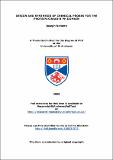Design and synthesis of chemical probes for the protein kinase B PH domain
Abstract
Phosphatidyl D-myo-inositol (3,4,5)-trisphosphate [PtdIns(3,4,5)P3] contributes to the activation of protein kinase B (PKB) by interacting with the PKB PH domain. PKB is known to be up-regulated in several cancer cell types. Compounds that can display selective inhibition of this kinase have promising chemotherapeutic potential, and inhibition of the PH domain of PKB represents a realistic means by which to achieve this. Analysis of the X-ray crystal structures of apo PKBαPH and PKBαPH bound to D-myo-inositol 1,3,4,5-tetrakisphosphate [InsP4, the inositol head group of PtdIns(3,4,5)P3] led to the design of PtdIns(3,4,5)P3 and InsP4 analogues as potential PKB PH domain inhibitors. The synthesis of PtdIns(3,4,5)P3 analogues modified at the C-4 position was investigated, but it was discovered that such compounds were prone to migration of the 1-position phosphate. Subsequently, a range of racemic InsP4 analogues, modified at the C-1 or C-4 position, were successfully synthesised. Advanced progress has also been made towards the synthesis of enantiomerically pure analogues of InsP4.
Type
Thesis, PhD Doctor of Philosophy
Collections
Items in the St Andrews Research Repository are protected by copyright, with all rights reserved, unless otherwise indicated.

